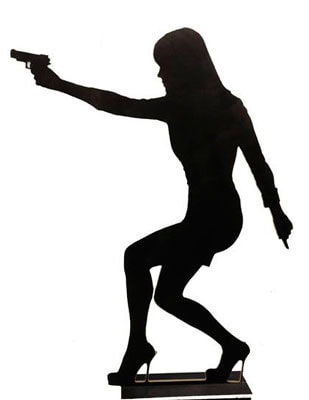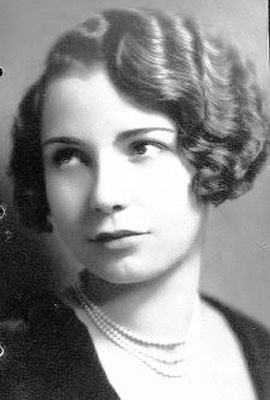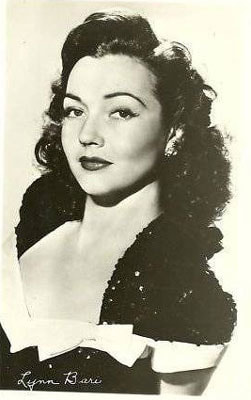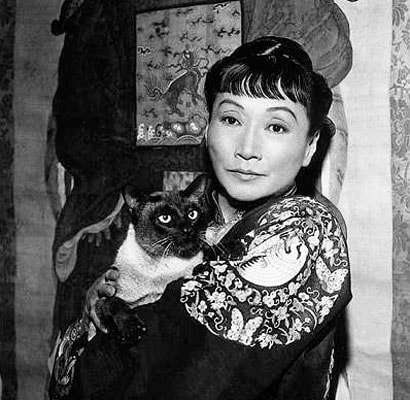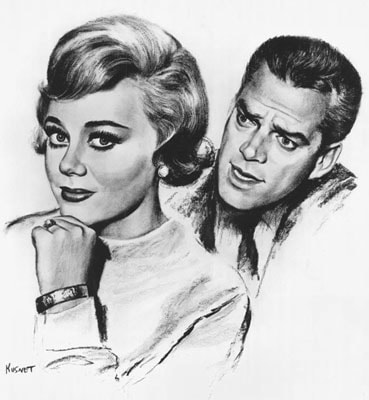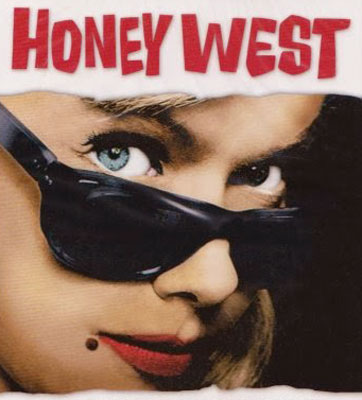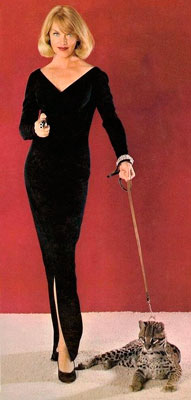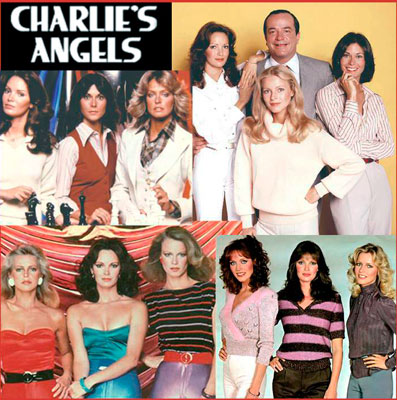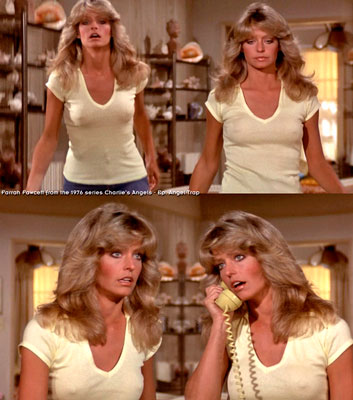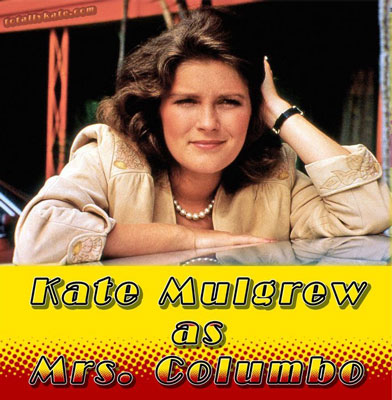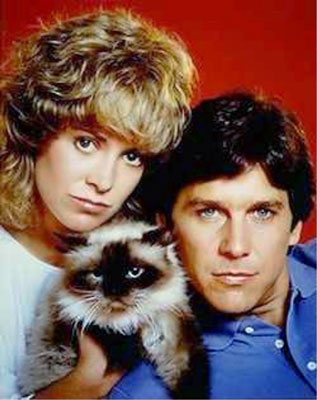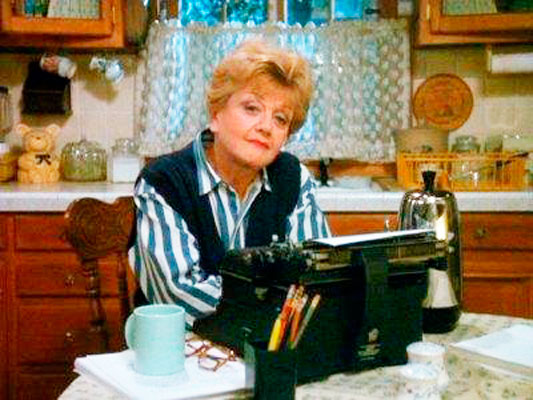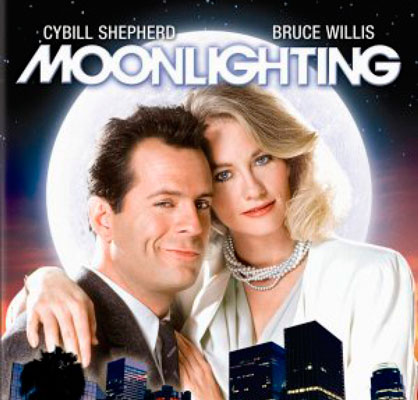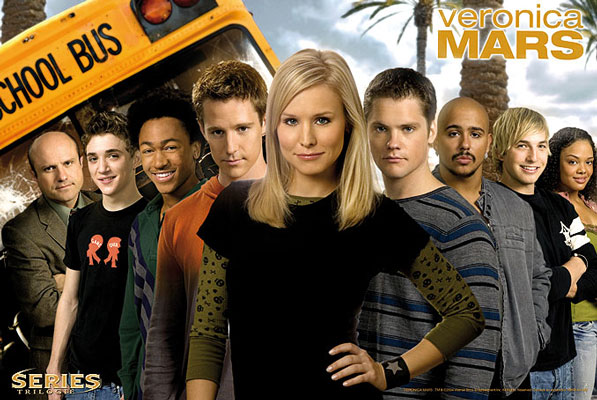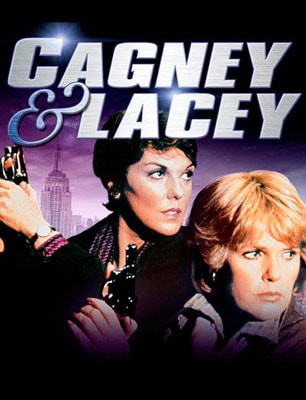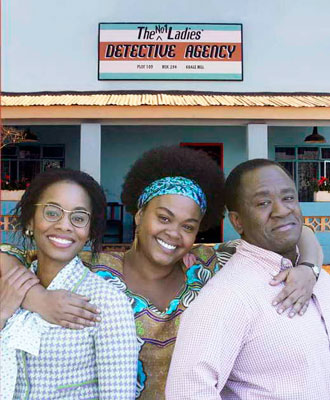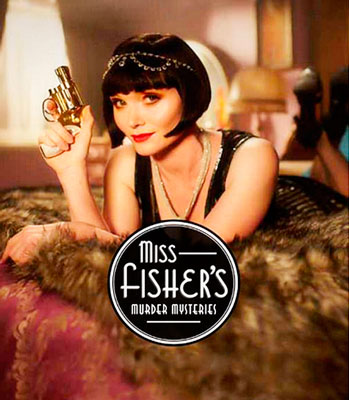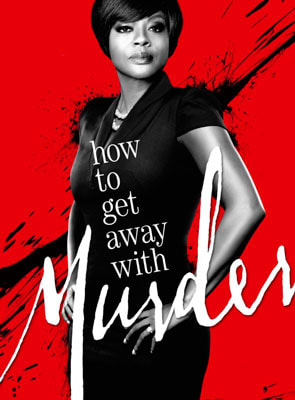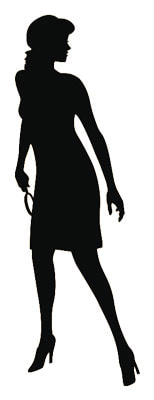
In Search of
the Lone Female Sleuth:
Women Detectives
and the Female Gaze on TV
by Paulette Reynolds
August 1, 2017
the Lone Female Sleuth:
Women Detectives
and the Female Gaze on TV
by Paulette Reynolds
August 1, 2017
"To borrow a phrase that I know very little about, I think it's important for women to be real "woke" right now in a general sense. And I do feel like young women, in particular, have woken up to the fact that things they took for granted can no longer be taken for granted. You've got to keep fighting for progress." Elizabeth Banks *1
As discussion swirls around the topic of women in film, the small screen has been put under the microscope as well. Does television enhance and encourage the development of the female gaze? Unlike the testosterone-soaked big screen film offerings, today's television lineup is more female-centric than ever. TV comes into the home and is part of the overall design, like a valued companion to our recliner chairs. Thanks to alternative viewing systems like cable, Netflix and Hulu, audiences have more control over their programming choices, with the content reflecting their own personal range of preferences. This freedom now dictates what women will - and won't - watch, and ironically, the film industry is beginning to feel its impact.
Take the detective genre. Primetime television has never been better for those of us who love murder mysteries, and from the police procedurals to the male lone detective, the choices are never ending. Yet American programming is almost nonexistent for the female detective who loves flying solo.
As discussion swirls around the topic of women in film, the small screen has been put under the microscope as well. Does television enhance and encourage the development of the female gaze? Unlike the testosterone-soaked big screen film offerings, today's television lineup is more female-centric than ever. TV comes into the home and is part of the overall design, like a valued companion to our recliner chairs. Thanks to alternative viewing systems like cable, Netflix and Hulu, audiences have more control over their programming choices, with the content reflecting their own personal range of preferences. This freedom now dictates what women will - and won't - watch, and ironically, the film industry is beginning to feel its impact.
Take the detective genre. Primetime television has never been better for those of us who love murder mysteries, and from the police procedurals to the male lone detective, the choices are never ending. Yet American programming is almost nonexistent for the female detective who loves flying solo.
Historically, the female detective on TV promoted gender equality while celebrating the independent spirit of women. American television programming may have offered audiences a narrow range of characters - from the exotic private eye Honey West to the amateur sleuthing of the more conventional Jessica Fletcher - but these women served as role models for female fans. They were part of a select group of women who took risks, were curious about their surroundings and questioned everything - and everyone. Audiences, especially women, wanted to identify with these sisters that were confident in their abilities and comfortable with challenging the male status quo.
Mirroring the struggles of women in the real world, the road is rocky for the independent American female sleuth on the small screen. The TV guide lineup may include her, but only in the guise of the ensemble mystery format - the rigid and often predictable police procedural. Yet, by her very nature, the female detective is - just like her male counterpart - a free spirit who enjoys solving the crime, usually with minimal help.
Mirroring the struggles of women in the real world, the road is rocky for the independent American female sleuth on the small screen. The TV guide lineup may include her, but only in the guise of the ensemble mystery format - the rigid and often predictable police procedural. Yet, by her very nature, the female detective is - just like her male counterpart - a free spirit who enjoys solving the crime, usually with minimal help.
Peggy Allenby as Phyl Coe, Philco's first radio Woman Detective
The small screen history of our feminine gumshoes began with radio. Radio shows were similar to television in that they were a uniquely home entertainment experience and began paving the way for the female TV detective. Philco's Mysteries of the Air first featured a 'lady detective', Phyl Coe, played by Peggy Allenby, in 1936, but dumped her in favor of the standard male detective a scant year later. This resulted in Kitty Keen, Inc. (1937), Carolyn Day (1940), Miss Pinkerton (1941), Meet Miss Sherlock (1946), The Affairs of Ann Scotland (1946/47), and Candy Matson (1949) - radio shows that thrilled audiences for an entire decade, proving that the self-reliant woman was here to stay. *2/3
Radio was kinder, of course, to the male detective of the 1940s, as Man Against Crime (1949-1954) and Martin Kane, PI (1949-1952) both enjoyed healthy serial runs.
Radio was kinder, of course, to the male detective of the 1940s, as Man Against Crime (1949-1954) and Martin Kane, PI (1949-1952) both enjoyed healthy serial runs.
Lynn Bari - The first female detective wannabe?
The television sets had barely began flying off the shelves when CBS made history with The Detective's Wife on July 7, 1950. The short-lived series was a summer filler that featured Lynn Bari as Connie Conway, who preferred helping Adam (a private eye) solve his cases rather than serving up dinner. (Sound familiar, I Love Lucy fans?)
The first female detective - Anna May Wong as Madame Liu-Tsong.
The first female detective on television was the noted Asian film actress, Anna May Wong, in The Gallery of Madame Liu-Tsong in 1951. Breaking new ground as the first Asian American to play a leading role in a TV primetime series, Ms. Wong played a Chinese art dealer who mixed work and detecting for ten episodes. Sadly, the show was canceled after one season by DuMont, and the contents of their vault were dumped into the Hudson River when they closed a few years later. But cinephiles can still enjoy Anna May Wong as the astrologer-detective Mei Lei Ling in her 1938 murder mystery film When Were You Born?
The 1950s treated viewers to no less than eight series that were male-centric: The Adventures of Ellery Queen (1950-1959), Sherlock Holmes * 1954, Perry Mason (1957-1966), Peter Gunn (1958-1960), 77 Sunset Strip (1958-1964), Bourbon Street Beat (1959-1960), The Detectives (1959-1962), and Hawaiian Eye (1959-1963).
Glynis Johns - Mystery Writer, Wife, and Sleuth.
Women and murder mystery enthusiasts had to wait until 1963 for another female detective. Again from CBS, Glynis was a comedy that starred Glynis Johns as another half of a married pair. This time Glynis Granville worked as a mystery writer (shades of Murder, She Wrote) who helped solve crimes with her lawyer husband, Keith. And again, the series was canceled after one season, even though it ranked #6 in summer reruns.
The lone tv female private eye again waited two more years for sultry Honey West to sizzle on ABC. Based on the popular pulp character created by Gloria and Forrest E. "Skip" Fickling, Honey was blonde, shapely and stylish - and her snappy witticisms didn't hurt either.
The boys in the front office gave her hot Jag car and a purring pet ocelot named Bruce. Of course Ms. West had to have a male partner and John Ericson served nicely as Sam Bolt. But Honey demonstrated during the 1965-1966 series that she could take care of herself, thank you. Her martial arts training and handgun skills let women viewers (like me) experience that most exotic of creatures - the Independent Woman.
"Honey West was grueling for me, very long and arduous during shooting. But I won a Golden Globe and was nominated for an Emmy. It was shot in black-and-white and we were planning to go to color the following season. But ABC [the network] and Four Star [the production company] disagreed and ABC said, "We can buy The Avengers cheaper than we can make Honey West". And that's exactly what happened. We were certainly on to something. When I looked at Moonlighting many years later with Cybill Shepherd and Bruce Willis, I thought, "Oh, my gosh! There we are again!" You know, the blonde detective racing around flirting and carrying on and the recalcitrant boyfriend who was always angry with the girl for getting into trouble." Anne Francis *4
Like Anna May Wong, Anne Francis became the first female private eye on primetime television - and Hollywood hasn't been the same since.
Yet 1960s saw men - again - rule the airwaves with Surf side Six (1960-1962), Mannix (1967-1975), Ironside (1967-1975), and the wildly popular Columbo (1968-2003). Columbo had the rare distinction of acting - and looking - like a lovable private eye, which kept audiences enthralled well past its due date.
The boys in the front office gave her hot Jag car and a purring pet ocelot named Bruce. Of course Ms. West had to have a male partner and John Ericson served nicely as Sam Bolt. But Honey demonstrated during the 1965-1966 series that she could take care of herself, thank you. Her martial arts training and handgun skills let women viewers (like me) experience that most exotic of creatures - the Independent Woman.
"Honey West was grueling for me, very long and arduous during shooting. But I won a Golden Globe and was nominated for an Emmy. It was shot in black-and-white and we were planning to go to color the following season. But ABC [the network] and Four Star [the production company] disagreed and ABC said, "We can buy The Avengers cheaper than we can make Honey West". And that's exactly what happened. We were certainly on to something. When I looked at Moonlighting many years later with Cybill Shepherd and Bruce Willis, I thought, "Oh, my gosh! There we are again!" You know, the blonde detective racing around flirting and carrying on and the recalcitrant boyfriend who was always angry with the girl for getting into trouble." Anne Francis *4
Like Anna May Wong, Anne Francis became the first female private eye on primetime television - and Hollywood hasn't been the same since.
Yet 1960s saw men - again - rule the airwaves with Surf side Six (1960-1962), Mannix (1967-1975), Ironside (1967-1975), and the wildly popular Columbo (1968-2003). Columbo had the rare distinction of acting - and looking - like a lovable private eye, which kept audiences enthralled well past its due date.
The more mature female amateur sleuth broke into the genre with The Snoop Sisters on NBC, airing from December 1973 until March 1974. Veteran film stars Helen Hayes and Mildred Natwick played Ernesta Snoop and Gwendolyn Snoop Nicholson. And although they weren't allowed to establish a loyal following, The Snoop Sisters helped advance older women into the detective game.
As the 1970s inched forward, Charlie's Angels burst onto the small screen with not one - or two - but three women in one show In 1976. Running for five seasons, the show introduced Kate Jackson, Farrah Fawcett and Jaclyn Smith as detectives who solved crimes and took prisoners. The show took a cue from the provocative nature of Honey West and hyper-sexualized the main characters, causing some critics to dub the approach as "Jiggle TV". Farrah Fawcett once attributed the show's success to this fact: "When the show was number three, I figured it was our acting. When it got to be number one, I decided it could only be because none of us wears a bra." *5
The producers attempted to play down the independent spirit of the series by casting an omniscient boss who went unseen ('Charlie') and two men to serve as backup (Bosley and Woodville). (One wonders why the 'boss' couldn't be a woman...sigh.) The frequent replacement of an Angel, plus the lack of quality scripts closed down the show in 1981, proving that sex doesn't necessary sell much of anything for very long.
However, the series went on to inspire two films in 2000 and 2003 that allowed Charlie's Angels be the empowered investigators they were meant to be, and collectibles, comics and video games followed. (Again, no female 'boss'.) Another Angel film is set for 2019, this time directed by actress/director/producer Elizabeth Banks.
However, the series went on to inspire two films in 2000 and 2003 that allowed Charlie's Angels be the empowered investigators they were meant to be, and collectibles, comics and video games followed. (Again, no female 'boss'.) Another Angel film is set for 2019, this time directed by actress/director/producer Elizabeth Banks.
1979 should have been a banner year for women detectives when Mrs. Columbo premiered, starring Kate Mulgrew in a spinoff series of the hit show, Columbo. Curiously, the male executives at NBC fumbled and stumbled around for one season, unable to create a show that could stand on its own. The show’s failure is proof enough that Universal and NBC needed a few women producers (zero women out of eight), writers (1 woman out of 23) and directors (11 men). *6
As usual, men received the lion's share of programming time in the 1970s for Cannon (1971-1976), Barnaby Jones (1973-1980), Harry O (1974-1976), The Rockford Files (1974-1980), City of Angels * 1976, Quincy M.E. (1976-1983), and Vega$ (1978-1981).
As usual, men received the lion's share of programming time in the 1970s for Cannon (1971-1976), Barnaby Jones (1973-1980), Harry O (1974-1976), The Rockford Files (1974-1980), City of Angels * 1976, Quincy M.E. (1976-1983), and Vega$ (1978-1981).
The 1980s began on shaky terms for the Woman Detective with an easily-forgotten series called Tucker’s Witch. Starring Catherine Hicks as a psychic private eye and Tim Matheson as her husband and partner in crime, this comedy mystery show only lasted 12 episodes in 1982.
Almost five years later Hollywood finally embraced the not-so-senior female detective series for more than one season. While audiences warmed to Honey West's charms, they positively glowed with CBS's golden girl detective, Jessica Fletcher, played by Angela Lansbury from 1984 to 1996.
Murder, She Wrote was a series that appealed to all demographics, since almost everyone remembers their English teacher - or had a retired one living next door. In this case Ms. Fletcher lived in Cabot Cove, a safe little town, nestled along the coast of Maine, where death and dead bodies seemed to spring up faster than weeds along the coastline.
What made this show so beloved by millions? Two words - Angela Lansbury. Her portrayal of a well-known mystery writer featured a bright, lively investigator, weaving murder and mayhem into every episode - all 264 of them.
''What appealed to me about Jessica Fletcher is that I...have little chance to play - a sincere, down-to-earth woman. Mostly, I've played very spectacular bitches. Jessica has extreme sincerity, compassion, extraordinary intuition. I'm not like her. My imagination runs riot. I'm not a pragmatist. Jessica is.'' *5
But, as usual, CBS wanted to pair her with a partner, but Ms. Lansbury quickly nixed that idea, ''The whole basis of the show is that Jessica is a middle-aged woman alone and the network wanted to have a character joined at the hip who drove a car for me.'' It's also worth noting that she also resisted any serious romantic attachments for her alter ego, although she did allow Dr. Seth Hazlitt (William Windom) into her select circle of friends. Murder, She Wrote enjoyed 12 years and gave Ms. Lansbury four Golden Globe awards. The record of 12 Emmy and ten Golden Globe nominations has yet to be beaten, by the way. *7
Murder, She Wrote was a series that appealed to all demographics, since almost everyone remembers their English teacher - or had a retired one living next door. In this case Ms. Fletcher lived in Cabot Cove, a safe little town, nestled along the coast of Maine, where death and dead bodies seemed to spring up faster than weeds along the coastline.
What made this show so beloved by millions? Two words - Angela Lansbury. Her portrayal of a well-known mystery writer featured a bright, lively investigator, weaving murder and mayhem into every episode - all 264 of them.
''What appealed to me about Jessica Fletcher is that I...have little chance to play - a sincere, down-to-earth woman. Mostly, I've played very spectacular bitches. Jessica has extreme sincerity, compassion, extraordinary intuition. I'm not like her. My imagination runs riot. I'm not a pragmatist. Jessica is.'' *5
But, as usual, CBS wanted to pair her with a partner, but Ms. Lansbury quickly nixed that idea, ''The whole basis of the show is that Jessica is a middle-aged woman alone and the network wanted to have a character joined at the hip who drove a car for me.'' It's also worth noting that she also resisted any serious romantic attachments for her alter ego, although she did allow Dr. Seth Hazlitt (William Windom) into her select circle of friends. Murder, She Wrote enjoyed 12 years and gave Ms. Lansbury four Golden Globe awards. The record of 12 Emmy and ten Golden Globe nominations has yet to be beaten, by the way. *7
Moonlighting is an example of what happens when you have an independent woman run a detective agency with a "man's man" as her partner. Cybill Shepherd and Bruce Willis played Maddie Hayes and David Addison, as oil-and-water pair of private investigators who clash over just about everything from 1985 to 1989. Described as an early form of 'dramedy', Moonlighting became a star vehicle for Willis' rapid-fire dialogue and snappy humor, which left Shepherd to play the sour-dour second banana, and ultimately the genre suffered at the expense of promoting the male gaze. True to form, the male producers blamed Ms. Shepherd for the show's demise as Willis went on to cinematic fame and fortune.
The 1980s would boast seven more detective shows, but only for the male of the species with Magnum PI (1980-1988), Joe Dancer (1981-1983), Simon & Simon (1981-1989), Remington Steele (1982-1987), Spenser: For Hire (1985-1988), The Equalizer (1985-1989), and The Law and Harry McGraw (1987-1988).
The 1980s would boast seven more detective shows, but only for the male of the species with Magnum PI (1980-1988), Joe Dancer (1981-1983), Simon & Simon (1981-1989), Remington Steele (1982-1987), Spenser: For Hire (1985-1988), The Equalizer (1985-1989), and The Law and Harry McGraw (1987-1988).
By the 1990s the Woman Detective was completely assimilated into the cop show and criminal lawyer sub genres, but Diagnosis: Murder (1993-2001) and Lands' End (1995-1996) gave American audiences two more male detective series.
Since 1996 only one female detective has wandered about the vast landscape, now clogged with police procedural and lawyer dramas. The last show to celebrate the independent female sleuth had to wait until the end of Murder, She Wrote in 1996, and then wait another eight years for teen sleuth, Veronica Mars. Starring Kristen Bell, it ran for three years, beginning in 2004, on UPN/The CW. Veronica split her time between high school and detective work - and of course, her PI dad was around to lend his wisdom. Even though it only lasted three seasons, Veronica Mars provided fans with several novels and a film - and hope for a future TV subgenre.
The 21st century ushered in several detective shows, again male centered: Castle (2009-2016), Monk (2009-2012), Elementary (2012 - present), and Dirk Gently's Holistic Detective Agency (2016-present).
The 21st century ushered in several detective shows, again male centered: Castle (2009-2016), Monk (2009-2012), Elementary (2012 - present), and Dirk Gently's Holistic Detective Agency (2016-present).
It's worth noting the success of two police procedural shows that were female-centered and thus helped to normalize women in a traditionally male genre - Rizzoli & Isles on TNT (2010-2016) and CBS's Cagney & Lacey (1982-1988). These characters examined the different facets of the working woman, exploring their lives as they struggled with their careers and family responsibilities, while taking down the bad guys. *8
The #1 Ladies' Detective Agency and Miss Fisher's Murder Mysteries also deserve honorable mention here, because these foreign imports underscore just how far the lone female detective has developed.
The former was a creative collaboration between HBO and the BBC and focused on the exploits of two South African women private investigators Precious Ramotswe and Grace Makutis. Based on the novels by Alexander McCall Smith, the South African setting served as a compelling backdrop and the bold casting of Jill Scott and Anika Noni Rose broke new ground in the genre in 2009 as the first black female private investigators. However, The #1 Ladies' Detective Agency was dropped after one season, even though it won a Peabody Award in 2010.
Miss Fisher's Murder Mysteries is also based on a popular literary detective, 1920s Phryne Fisher, an Australian private investigator with a love for hot jazz, handsome bedfellows and murder. Created and produced by Deb Cox and Fiona Eagger, Phryne's Essie Davis brings to life a distant cousin of Honey West, who relies on her sound common sense, a close circle of friends and her golden gun to solve the crime. First run in 2012 on ABC, it's now popular in the United States, via Acorn and fans hope for a fourth series, although there is cyberspace chatter of a film treatment. What sets Miss Fisher apart is the almost obsessive attention to historical detail in this period mystery and the fact that the show's creative team is run by women.
So does television enhance and encourage the development of the female gaze? Yes - and no.
Since 1950 women enjoyed only 11 American television series centering on the Female Detective - and since that time 34+ series celebrated the Male Detective. Anglophiles, detective and mystery fans must be content with the British imports - like Miss Marple - via PBS, Acorn, Britbox, Ovation and BBC America.
Of course television plays an active role in directing the female gaze vis a vis the female detective. The sheer number of actresses leading police shows is a positive step forward - especially for breakout hits like How to Get Away with Murder, starring the fabulous Viola Davis. But it begs the question as to why TV creators don't put the same effort into creating new programming featuring the independent female sleuth or private investigator.
Since 1950 women enjoyed only 11 American television series centering on the Female Detective - and since that time 34+ series celebrated the Male Detective. Anglophiles, detective and mystery fans must be content with the British imports - like Miss Marple - via PBS, Acorn, Britbox, Ovation and BBC America.
Of course television plays an active role in directing the female gaze vis a vis the female detective. The sheer number of actresses leading police shows is a positive step forward - especially for breakout hits like How to Get Away with Murder, starring the fabulous Viola Davis. But it begs the question as to why TV creators don't put the same effort into creating new programming featuring the independent female sleuth or private investigator.
Sadly, the answer is all too obvious - we’re waiting for the female artists in the television industry to step out of the shadows and create Her.
References:
* 1 Bryan Elise. Sandberg Why Hollywood Women Need be Real Woke. June 12, 2017. http://www.hollywoodreporter.com/news/elizabeth-banks-directing-a-charlies-angels-reboot-why-hollywood-women-need-be-real-woke-q-a-1010198
* 1 Old Time Radio Downloads. https://www.oldtimeradiodownloads.com/crime/phyl-coe-mysteries / Can listen to the entire season of 12 episodes, starring Peggy Allenby and Bud Collyer
* 2 Erika Janik. Sleuthing on the Airwaves. A wonderful blog features many of the female detectives from the golden age of radio https://erikajanik.com/2016/05/12/sleuthing-on-the-airwaves/
* 3 Lady Crimefighters. Jack French, 1998 http://www.otrsite.com/articles/artjf009.html
* 4 David D. Duncan Hollywood Heroine. August 11, 1997.
http://weeklywire.com/ww/08-11-97/memphis_sofea.html
* 4 Gary Warren Niebuhr. Honey West: A Fresh Look. 2005. http://www.mysteryfile.com/Honey%20West/Honey_West.html
* 5 Wikipedia: Charlie's Angels
* 6 IMDb: Mrs. Columbo
* 7 Aljean Harmetz. Angela Lansbury's Unlikey Sleuth has Staying Power. October 10, 1985.
http://www.nytimes.com/1985/10/27/arts/angela-lansbury-s-unlikely-sleuth-has-staying-power.html?scp=13&sq=murder%20she%20wrote&st=cse&pagewanted=2
* 8 Pauline Dewan. Police Detectives - Private Investigators. Mystery Page Turners. January 11, 2009 http://mysterypageturners.blogspot.com/2009/10/police-detectives-private-investigators.html
* 1 Bryan Elise. Sandberg Why Hollywood Women Need be Real Woke. June 12, 2017. http://www.hollywoodreporter.com/news/elizabeth-banks-directing-a-charlies-angels-reboot-why-hollywood-women-need-be-real-woke-q-a-1010198
* 1 Old Time Radio Downloads. https://www.oldtimeradiodownloads.com/crime/phyl-coe-mysteries / Can listen to the entire season of 12 episodes, starring Peggy Allenby and Bud Collyer
* 2 Erika Janik. Sleuthing on the Airwaves. A wonderful blog features many of the female detectives from the golden age of radio https://erikajanik.com/2016/05/12/sleuthing-on-the-airwaves/
* 3 Lady Crimefighters. Jack French, 1998 http://www.otrsite.com/articles/artjf009.html
* 4 David D. Duncan Hollywood Heroine. August 11, 1997.
http://weeklywire.com/ww/08-11-97/memphis_sofea.html
* 4 Gary Warren Niebuhr. Honey West: A Fresh Look. 2005. http://www.mysteryfile.com/Honey%20West/Honey_West.html
* 5 Wikipedia: Charlie's Angels
* 6 IMDb: Mrs. Columbo
* 7 Aljean Harmetz. Angela Lansbury's Unlikey Sleuth has Staying Power. October 10, 1985.
http://www.nytimes.com/1985/10/27/arts/angela-lansbury-s-unlikely-sleuth-has-staying-power.html?scp=13&sq=murder%20she%20wrote&st=cse&pagewanted=2
* 8 Pauline Dewan. Police Detectives - Private Investigators. Mystery Page Turners. January 11, 2009 http://mysterypageturners.blogspot.com/2009/10/police-detectives-private-investigators.html
COPYRIGHT 2012/2021. Paulette Reynolds. All CineMata Movie Madness blog articles, reviews, faux interviews, commentary, and the Cine Mata character are under the sole ownership of Paulette Reynolds. All intellectual and creative rights reserved.
